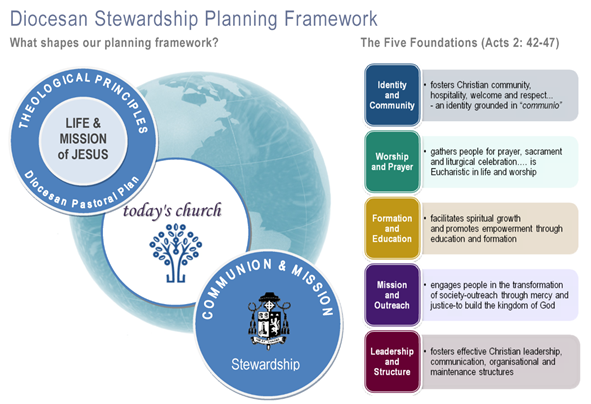The theme for this year is Shaping Peace Together and this is done by spreading compassion, kindness and hope in the face of the pandemic by standing together against attempts to use the virus to promote discrimination or hatred. I hope that nonviolence becomes a way of life for all, personally, nationally and globally.
I am returning from taking a week’s break, just to slow down and to take time off from the constancy of thinking. I must admit to feeling a resistance in returning having spent time reading, knitting, walking in the rainforest and gardens, visiting our children and grandchildren in the Gold Coast ‘COVID - bubble’, and resting. It was great to stop and just enjoy the reduced pace.
Anyway, I am back and will break open with you the fifth of our diocesan foundations – Leadership and Structure. It is in this foundation that the most private pain, and public expression of this, has generated the most comments in our listening and dialogue sessions. Once again, there are people working on proposals to address these issues so that the challenges can be converted into action.

You may recall the following diagram which reflects our Diocesan Stewardship Planning Framework.

The Discernment of Data Focus Group reviewed the data from the first session of our own diocesan synod of November last year as well as information coming from the Plenary Council, particularly the information gathered from our diocesan submissions. This enormous amount of data was then allocated into the five foundations.
Within the foundation Leadership and Structure the following key areas were identified:
- Change/Transformation of Culture
- Servant Leadership
- Ordained Leadership
- Leadership/Management Structures
- Diocese/Parish Relationships
- Local Parish Leadership
- Sexual Abuse and The Royal Commission
- Bringing the Church into the 21st Century
- Plenary Council Process
The members of the Discernment of Data Focus Group then listed what had been heard, under each of the key areas. What we heard can be quite challenging, as it might reflect the reality of some, but not others. The task in leading up to the second session of our diocesan synod will be to formulate proposals for further dialogue and discernment.
I have included three of the theological principles which came from the 1992/93 Diocesan Synod as they still are relevant to our present reflections.
LEADERSHIP AND STRUCTURE
Inclusive, Participative and Synodal
Theological Principle 3.7 – Servant Leadership
Leadership at all levels within the Church
is a ministry of service to God's People.
The rulers of the Gentiles lord it over them
... It must not be so among you
for whoever would be great among you must be your servant
and whoever would be first among you must be your slave
even as the Son of Man came not to be served but to serve
and to give his life as a ransom for many. (Mt 20:25-28)
Theological Principle 3.8 - Decision-making by Discernment
In keeping with what it means to be and to build Church,
we seek to arrive at decisions which all can accept gracefully and
support wholeheartedly (even if some wish the decision had been different)
because they know the group honestly searched together
for the Spirit of God in and for the life of the community.
Discernment of the Spirit ... listens to others so as to learn, is sensitive to all approaches, encourages collaboration rather than competition and aims not at majority vote but consensus. It recognises that each participant has a part of the truth and a share of the wisdom by reason of each one's unique experience of God in life, union with Christ and gifts of the Spirit. The process also recognises the right of each person to contribute his or her part without which the whole picture will not be presented and the whole wisdom of the spirit will not be available[1]
Theological Principle 3.9 - Read the Signs of the Times
To fulfil our mission in today's world
and become a credible sign of God's love for all people,
we must discover the signs of God's presence
and purpose in our culture and in our world.
Reading the signs of God for our time means
being open to hear what the Spirit is saying
to the Church through the hearts and minds of his people.
The joys and hopes, the griefs and anxieties of people of this age,
especially those who are poor or in any way afflicted,
these are the joys and hopes, griefs and anxieties of the followers of Christ. [2]
1. Change/Transformation of Culture
What we heard:
Some Diocesan Plenary Council and Synod responses indicated that people saw the need for:
- Leaders at all levels who are:
- willing to discern the will of the Holy Spirit and courageous enough to be open to change that allows the church to be truly the sign and instrument of God’s mission in and to our world
- open in heart and mind to new possibilities and ways of thinking in undertaking God’s work
- truly willing to read the signs of the times
- open to conversion, renewal and reform for self and for the community
- prepared to speak courageously like prophets; to break the walls of the museum; to go back onto our pilgrim journey
- Institutional change in governance - new model of Church, diocese, parish
2. Servant Leadership
What we heard:
Some Diocesan Plenary Council and Synod responses indicated a need:
- To re-image a ‘governance’ that directs attention to the person of Jesus the Christ, rather than to the structures of administration and power; that is pastoral first and foremost, more than a business corporation
- For the importance of good leadership and governance with accountability, inclusion in decision-making and appointments, equality and transparency, with synodality and subsidiarity, and with ongoing and open dialogue with all Christ’s faithful
- To look afresh honestly and openly at questions of governance and leadership, and challenge structures which restrict/limit/block mercy, humility and healing
- To be inclusive and sensitive to needs of women – gender equality in all leadership roles
- For leadership which is crucial to communicating to parishes the notion of inclusive, participative and synodal movement
3. Ordained Leadership
What we heard:
Some Diocesan Plenary Council and Synod responses indicated a need:
- To re-examine ordained ministry and lay ministry - acknowledge the failures of a false sense of superiority, that ‘we’ know it. Priests/bishops should be evaluated
- To explore the nexus between ordination (open to a tiny percentage of the people of God) and leadership based on the gospel; needs to be abandoned – It’s not working!
- To address Clericalism/ Institutionalism and its impact on decision making; replace clericalism with the involvement of all the baptised
- For priests to be more spiritual, more open to their parish community, going out to the locals as a group to speak and invite people to join us
4. Leadership/Management Structures
What we heard:
Some Diocesan Plenary Council and Synod responses indicated a need:
- To explore the possibility of a new leadership and governance model
- For transparency, accountability, responsibility, compliance in all church agencies
- For decision-making by discernment (DPP Principle 3.8)
- To address systemic issues in order to form better relationships - especially where the system creates division e.g. schools and parishes
- To adopt principles and practices of models of successful businesses, but the Church is called primarily to mission, to proclaim Christ the Good News of God’s love for all
- To examine the “business” presence of the Diocese in Catholic Care, pre-schools, schools and aged-care. We seem to be Government-funded generic ‘helpers’. Is this our mission?
- To address the need for the just remuneration of lay ministers/ as recommended in past Assemblies
- For greater involvement of women as essential at every level of governance and leadership so as to address gender inequity and to recognize women as being leaders in the church
- For shared leadership - how best to involve committed lay women and men in contributing their gifts to church governance
- To examine and develop all forms of diocesan communication. Don’t assume the website is enough when even computer literate people rarely access it

5. Diocese/Parish Relationships
What we heard:
Some Diocesan Plenary Council and Synod responses indicated that people saw the need:
- To Improve relationships and communications between the Diocese, parishes and congregations – be more open and transparent
- To address lack of connection between diocese and parishes e.g. no connection between Council For Mission and parish/parish councils
- To consult when required and not to be an imposition of ideas
6. Local Parish Leadership
What we heard:
Some Diocesan Plenary Council and Synod responses indicated that people saw the need:
- For careful selection of priests and others for parish leadership
- For parishes to be converted from maintenance to mission
- To identify “high performing” parishes and priests – share best practice
- To measure “engagement” levels of parishioners
- For Pastoral Planning: Set goals and objectives for each parish/priest, publish and share these and then measure performance
- To support overseas priests - problem of cultural differences, understanding accents, etc.
- For more local decision-making. Subsidiarity – local actioning in practice. Don’t restrict people from using their gifts
- To restructure the clergy’s part in parish decision-making. Parish priests should not be able to override the will of the people
- For the clergy to trust lay people, recognise the education of lay people today and their call to do more than administrative tasks
- For healthy joyful service within a parish community. People need the assurance that there is a structure that will encourage and support them, and have an exit plan!
- To explore the possibility that a parish be lay-led or under a lay administrator
- For a review of our church buildings to ensure that they are accessible to all
7. Sexual Abuse and The Royal Commission
What we heard:
Some Diocesan Plenary Council and Synod responses indicated that people saw the need:
- As a diocesan community to develop humility and own our brokenness and incompleteness by addressing our history of sexual abuse. We need to acknowledge what the church has failed to achieve in order to move forward
- To acknowledge what our diocese has done to address sexual abuse and support victims - Safeguarding of children and vulnerable adults
- To regain trust and to help people heal after the sexual abuse crisis. More transparency and accountability needed
- To acknowledge the loss of credibility and trust within the community
- For greater concern for victims and survivors - Need for institutional church change - expressing genuine as opposed to legalistic apology for all the abuse and lack of compassion
- To repent for clergy sexual abuse; healing liturgies and public signs or acts of reparation; ongoing and frequent liturgies of apology, forgiveness and mercy; open acknowledgment by priests at Mass, of sexual abuse
- For better implementation of Royal Commission recommendations
- For healing and moving beyond the clergy sexual abuse scandal; need to let go of what has been in the light of the institutional church’s betrayal of the People of God (of Royal Commission) and find new models based firmly on the gospel
- For more study on causes and implications of child sexual abuse
- Not to treat all people or priests as paedophiles
- To care for paedophile priests
8. Bringing the Church into the 21st Century
What we heard:
Some Diocesan Plenary Council and Synod responses indicated that people saw the need:
- For more positive Church public relations
- To modernise Church teachings - allowing contraception and IVF; supporting same-sex marriage; supporting abortion and euthanasia; ordination of women
- For radical change, a new order, inverted pyramid
- To check for understanding -“Catholic jargon”. Change church rules to reflect acceptance of all can be a barrier to knowing/belonging for youth, English as second language, and converts
- Not to change without good reason - the saving of souls was never mentioned
9. Plenary Council Process
What we heard:
Some Diocesan Plenary Council and Synod responses indicated:
- Scepticism about the Plenary Council process
- Exclusion of lay people and women from the decision-making roles of the Plenary Council
- That the Plenary Council was not necessary vs more frequent Plenary Councils in Australia!
- The need to listen to the spirit of the law, and be freed from the letter of the law
- That a national platform would allow people to connect with others of interest – projects; missionary services
- The need for a national program of servant leadership for our emerging lay leaders
- What the Catholic Church does well e.g. Synodal process to allow others to provide input

I apologise that this is such a long message. Clearly, of all of our five foundations, this one has generated the most comment and concerns. And I finish with the words from the prophet Isaiah (55:6-9) from this weekend’s readings:
Seek the Lord while he is still to be found, call to him while he is still near…… for my thoughts are not your thoughts, my ways not your ways - it is the Lord who speaks. Yes, the heavens are as high above the earth as my ways are above your ways, my thoughts above your thoughts.
That concludes the series of the issues that have emerged from our listening and dialogue processes for both the Plenary Council and the Diocesan Synod. Please pray for the Focus Groups and Teams who are now working on the proposals/recommendations which will be presented back to you before our next session of synod.
[1] Archbishop F Carroll, Canberra-Goulburn Synod, 1989
[2] Gaudium et Spes, Pastoral Constitution on the Church in the Modern World, Second Vatican Council